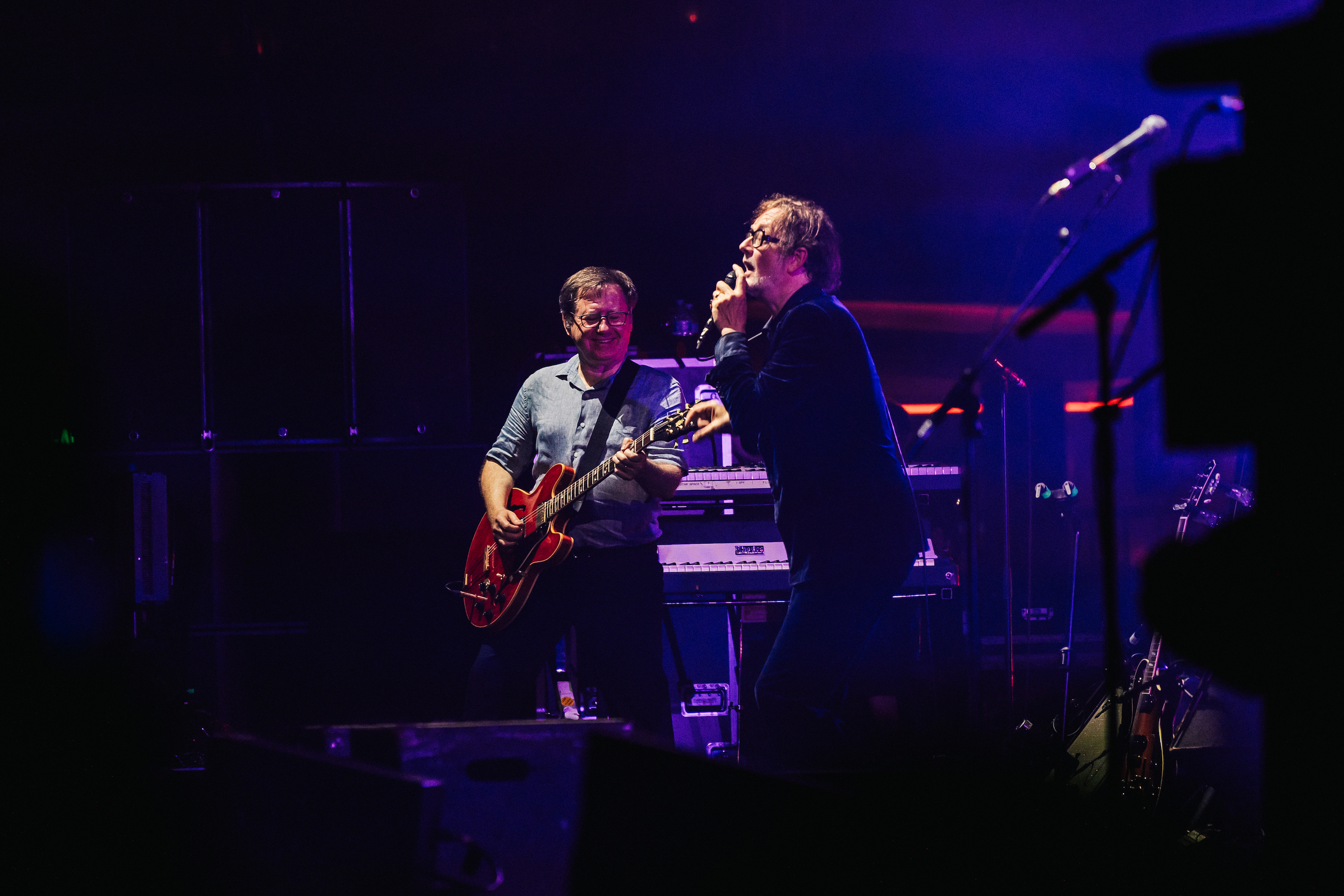There’s an impatient queue at the Hat & Beard Press booth during the inaugural Analog Outlaw Book & Record Fair held at Zebulon, the multipurpose venue in Los Angeles’ Frogtown neighborhood. The people in the queue are clued-in Pulp fans who have come to collect their pre-order copies of the upcoming book, I’m with Pulp, Are You?. It’s a special opportunity, as they can get their collectible volumes signed by its author and compiler, Pulp guitarist Mark Webber.
For his part, Webber is doing his diplomatic best to give each fan his full attention. Pulp played to 12,000 people over the course of three gigs in Los Angeles in the week leading up to this fair. It’s understandable that these book buyers are excited about interacting with someone from the band. I’m with Pulp quickly sells out, but that doesn’t deter anyone. Webber signs a $5 bill for one fan, while another puts friendship bracelets on Webber’s wrist. Yet another fan lifts her skirt and we all lean in to gape at a tattoo she has on her thigh of Pulp’s late bass player, Steve Mackey. The book hadn’t officially been published at the time of the fair. Its UK publish date of October 3 was still a couple of weeks out, its US street date of November 5 even further. But seeing glimpses of the 300-page, full-color, beautifully bound, shimmery gold coffee table book in real life whips the anticipation into a frenzy.
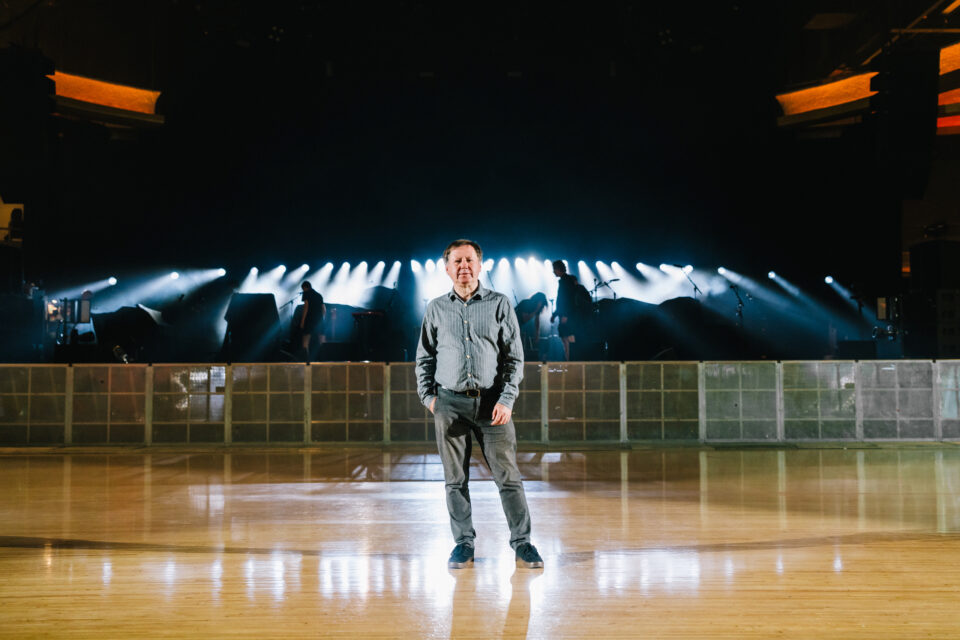
Mark Webber at Hollywood Palladium, 2024 / photo by Daniel Cavazos
The way Webber envisioned I’m with Pulp, Are You? is similar to books he’d seen on The Velvet Underground with “tattered bits of paper reproduced on new paper.” He’s certainly achieved that. Webber’s book is packed with his collection of photographs, flyers, postcards, posters (much of the early ones handmade), stickers (some of them made by former guitarist Russell Senior on color copier), fanzines (including early ones created by Webber himself), backstage passes, setlists, handwritten notes, advance cassettes, fan-made items, newsletters from Pulp People (the band’s official fan club), and various other ephemera. My personal favorite: a handwritten ticket to a 1980 Pulp gig.
A self-confessed hoarder, Webber doesn’t only have memorabilia from his time in Pulp, but also from the decade prior when he was a show promoter for the band and the president of their fan club, and later their guitar tech and then tour manager before being asked to join Pulp as an official member. “I’ve always saved all this stuff,” says Webber after the fair as we’re cooling down with iced beverages at the trendy Mexican eatery Salazar next door. “Not with anything in mind other than being the kind of person that likes to save stuff. During lockdown, I was going through boxes that were piled into a room that no one ever looked at. It was all my Pulp stuff. I’m getting old, and my memory is not what it was. There were things that I couldn’t even remember seeing before.”
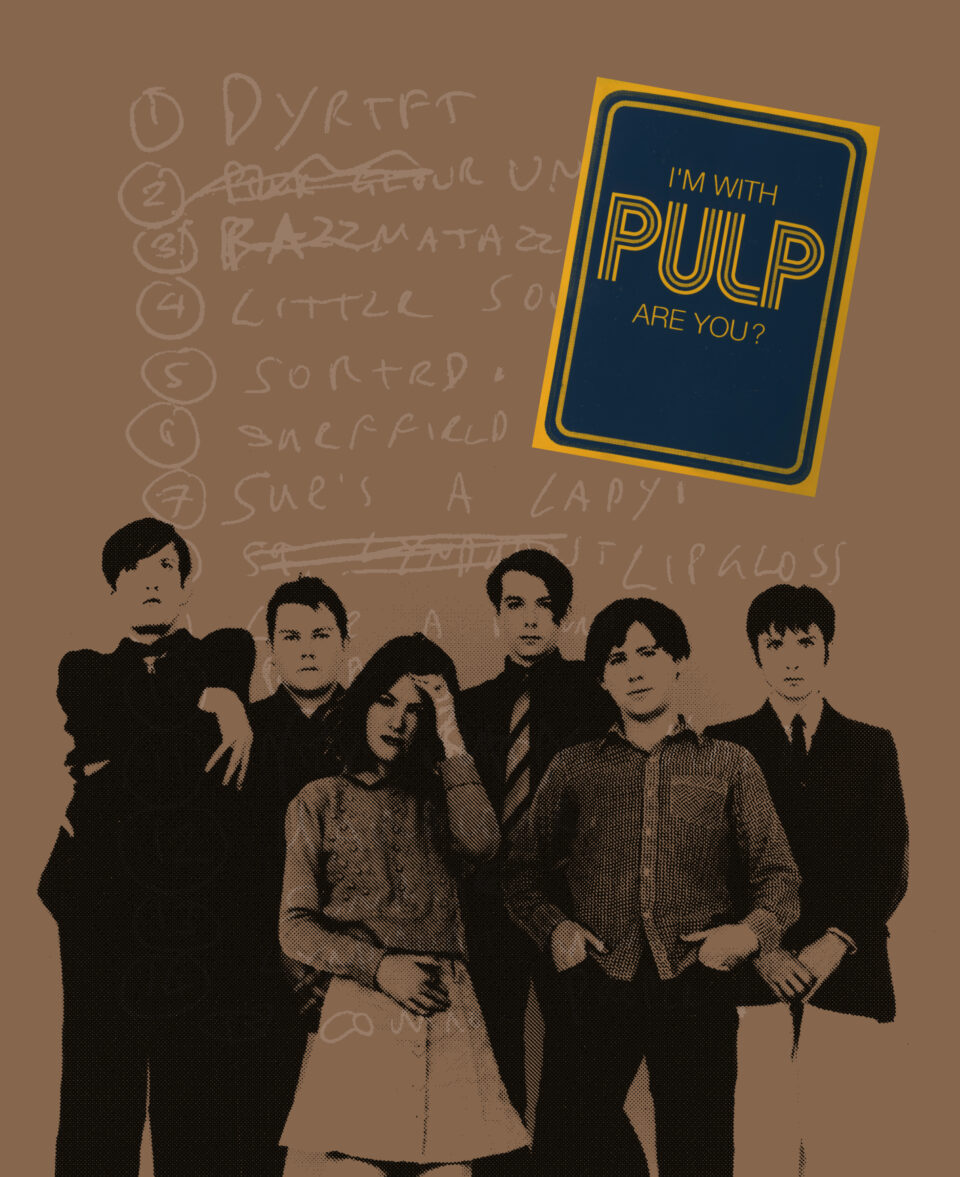
“Originally it was going to be an introduction and extended captions that would give a bit of context. But once I started doing it, I got quite a bit carried away and wrote a lot more than I intended.”
While the cool and unexpected graphics of I’m with Pulp paint an insider portrait of the band that’s singular to Webber, the accompanying text—penned by him—is autobiographical rather than simply captions. “I’m not a verbose person,” says Webber, whose shyness is arguably one of his most known characteristics. “I’d edited books and I’ve written program notes for film screenings, but I really try to avoid writing. I find it difficult, and I don’t really enjoy it. Originally it was going to be an introduction and extended captions that would give a bit of context. But once I started doing it, I got quite a bit carried away and wrote a lot more than I intended.”
Webber’s is the fourth book to be published by a member of Pulp in the last decade. Senior (Freak Out the Squares: Life in a Band Called Pulp) and drummer Nick Banks (So It Started There: From Punk to Pulp) had memoirs out in 2015 and 2023, respectively. Frontman Jarvis Cocker released his own coffee table book, Good Pop, Bad Pop—which isn’t unlike Webber’s—in 2022. Cocker has written a glowing foreword for I’m with Pulp in which he acknowledges Webber’s contributions to the group. “He brought something discerning to the band,” Cocker writes of Webber. “He made us better.”
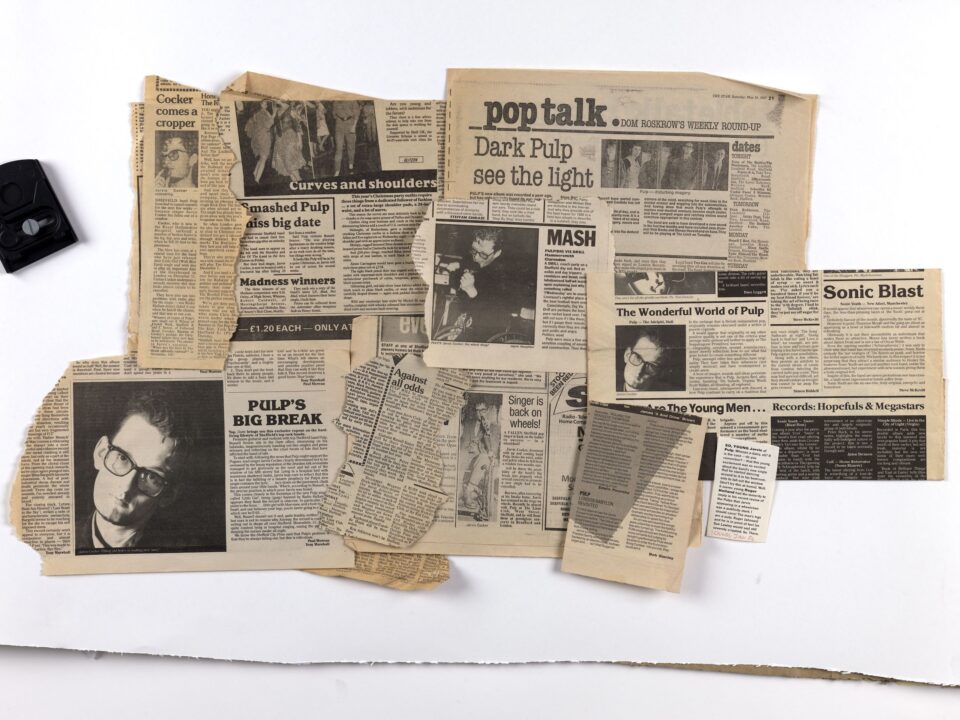
“During lockdown, I was going through boxes that were piled into a room that no one ever looked at. It was all my Pulp stuff. There were things that I couldn’t even remember seeing before.”
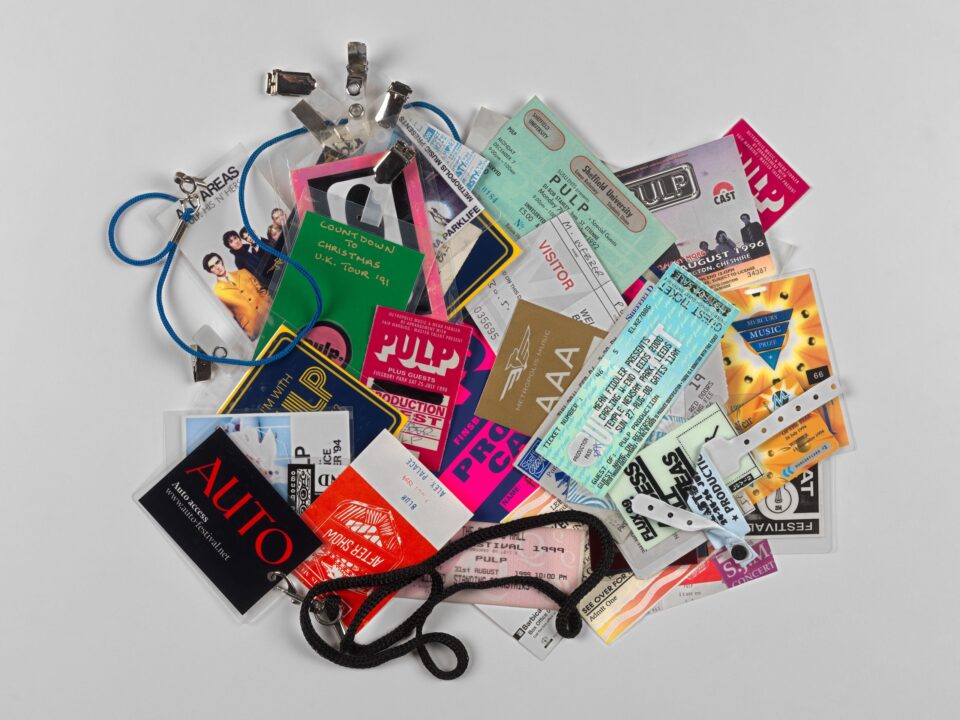
Cocker had already received the PDF of I’m with Pulp prior to the release of his own book. He may very well have had a similar experience unearthing Pulp items and come up with an idea for a book like Webber’s. But there’s something earnest about Webber clinging to things like annotated pages of setlists and songs—and the 500 pieces of Cocker’s trousers which went out with issues of Pulp People, the competition winner snagging the coveted zipper. The stuff of Patreon dreams.
What stands out from Webber’s narrative is his brutal honesty, both about himself and with regard to Pulp. He ducks his head when I read passages I’ve earmarked that not only don’t pull any punches, but are in turns funny and heartbreaking. For example, when a band becomes successful, “You do the same things over and over and over and over again” he writes at one point. At another he asks, “I mean, once you’ve received a platinum disc, what do you do now with the gold and silver ones?” For the record, Webber’s quadruple-platinum disc for Different Class lives under the bed in his parents’ spare bedroom.
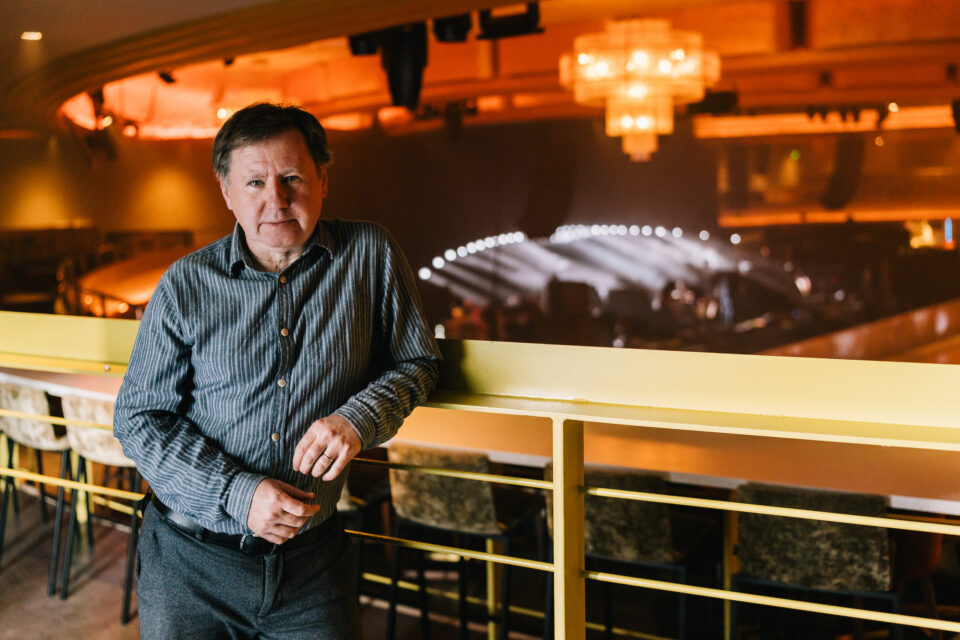
Mark Webber at Hollywood Palladium, 2024 / photo by Daniel Cavazos
But perhaps the quote that stuck with me the most is when Webber states, unapologetically, that he was, “feeling generally unable to relate to people who told me they were fans of the band.” Webber only speaks for himself in I’m with Pulp, Are You? and doesn’t remotely profess to explain any of his bandmates’ actions or feelings. But even so, the way he’s chunked the book by album and the companion words he’s written about each era from his perspective illuminate a lot about Pulp. What he avoids is repetition, so while the group may have felt like they were on a bit of a hamster wheel during their heyday, that’s not at all the feeling generated by I’m with Pulp.
“Suddenly I was actually in the band and could exert a certain influence,” says Webber. “But then, I very quickly found that my influence was relatively insignificant. Or it was good for a while, and then other people who’ve maybe got a bit more influence were more interested in doing other kinds of stuff. Pulp had already been doing it for a long time before that moment came when we became successful, so we were not wide-eyed and loving everything. We were pretty cynical about the whole thing, especially in America. Because we were older, we were not willing to tour endlessly, like it seemed you had to do. We thought, ‘We’ll do these few things, and maybe that's enough.’ Not worth killing ourselves.
“It’s really different now,” he continues. “We’re not promoting anything. We don’t play that many shows. And we can afford to do it comfortably. Hollywood Bowl is the ambition, but that might be a step too far.” FL

PULP at Hollywood Palladium, 2024 / photo by Daniel Cavazos

